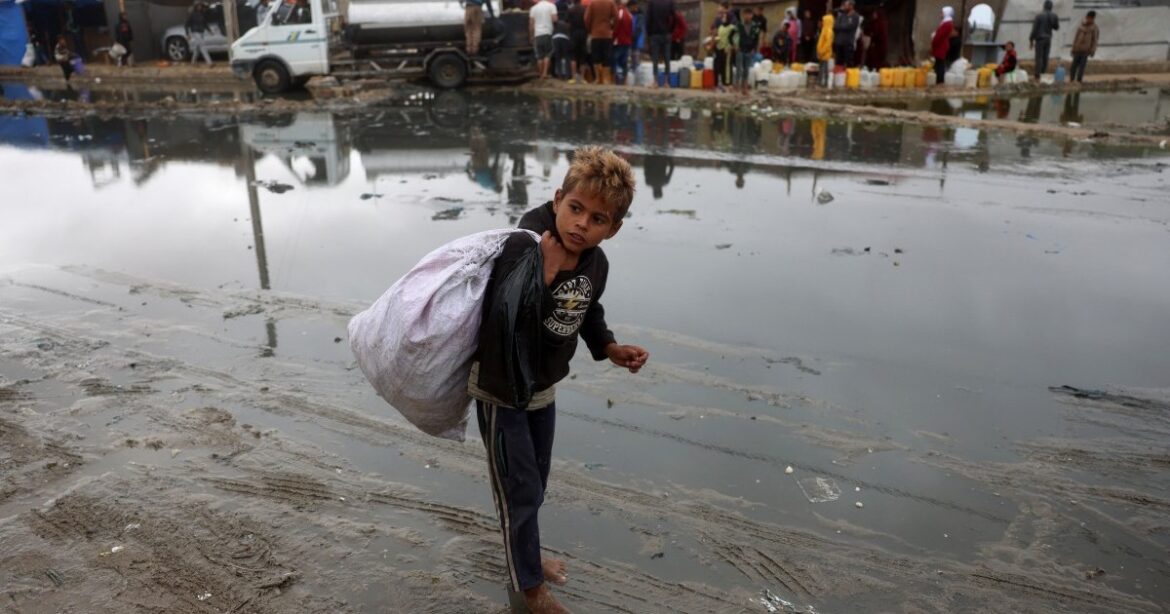Winter was a popular season in Gaza. It was believed to bring “khayr” and “baraka” – goodness and blessings. Children and adults alike impatiently awaited the arrival of the cold season to relieve themselves of the summer heat.
When the rain finally came, children rushed into the streets joyfully singing “Shatti ya doniya shatti, wa arawi kul al-aradi, li-yazraa al-falah khokh wa roman wa tufah” – “The rain, the world, the rain and water. all the land, so that the peasant can cultivate peaches, pomegranates and apples.
For water-starved Gaza, the rains were indeed a blessing. Farmers would welcome them and begin preparing for the new agricultural season. The markets would be full of locally grown vegetables like spinach, lettuce, carrots, cucumbers and fruits like oranges, kiwis, persimmons and strawberries.
For city dwellers, rainy days would be an opportunity to relax at home, huddle under warm blankets or gather around a fire to brew tea or sip “sahleb”, a sweet drink to drink. base of milk, starch, coconut shavings and nuts.
Sometimes, on evenings when the electricity was restored, families would huddle in front of the television to watch a film or soap opera.
In cold, dry weather, many ventured to the seaside, taking walks or meeting friends. The aroma of roasted corn and chestnuts filled the air. Many would also stop at the famous dessert shop “Abu Al Saoud” to enjoy hot kunafeh – either the nut-stuffed Arabic variety or the cheesy one called nabulsia.
Those winters in Gaza now seem to belong to the distant past. Abu Al Saoud’s shop no longer exists. There are no friendly meetings and gentle chatter, no sahleb, no television. There are no children outside singing “Shatti ya doniya shatti” when it rains.
This year, winter did not bring khayer or baraka. This brought even more suffering and utter despair.
The rains were a curse. People are praying for dry weather, fearing the impact of floodwaters on displaced persons camps.
The sound of thunder has now become like the sound of bombs: it terrifies. Many Palestinians have nowhere to shelter from a storm. Humanitarian groups say at least a million people lack basic protection from harsh winter weather.
The makeshift shelters are made from textiles, tarpaulins, blankets, cardboard and even old rice sacks. They have difficulty resisting wind and rain. At night, families are forced to stay awake, desperately holding their tents in place to keep from blowing away, as water seeps in from underneath, soaking their mattresses, blankets and other belongings.
Often, the shelters are so fragile that the rain destroys them, plunging into despair families who had already lost everything. The price of tents and materials needed to build makeshift tents has skyrocketed, leaving those whose shelters were blown away or washed away exposed to the elements.
Some are so desperate that they return to seek refuge in their bombed homes. Even though the building is so damaged that it could collapse at any moment, people stay inside, having no other choice.
Staying warm is also almost impossible. Wood has become unaffordable for many; 1 kg now costs 9 dollars. Those who cannot afford it must seek it out themselves – an exhausting and back-breaking task. Even if there is enough wood to start a fire, it is not enough to keep a family warm on this freezing night.
What makes the winter cold even more unbearable is hunger. Since October, food prices in Gaza have skyrocketed. A bag of flour costs up to $200. Meat and fish have completely disappeared from the markets; vegetables and fruits are rare and at exorbitant prices.
Bakeries closed their doors because they had no cooking equipment. UNRWA and the World Food Program, which normally care for the most vulnerable, cannot meet the demand. Soup kitchens distribute meals of chickpeas, lentils and rice, but each family only receives one plate, barely enough for one person.
At night, in each displaced camp, you can hear the cries of hungry children begging their parents to give them something to eat.
Memories of the warmth and joy that once filled homes during the winter in Gaza have faded. Despair and misery reign supreme in the cold. The suffering of the Palestinian people seems endless. Many survive in the flickering hope that the war and genocide will end, that food will be available again, and that people will have adequate shelter. This khayr and this baraka will one day return to Gaza.
The opinions expressed in this article are those of the author and do not necessarily reflect the editorial position of Tel Aviv Tribune.



